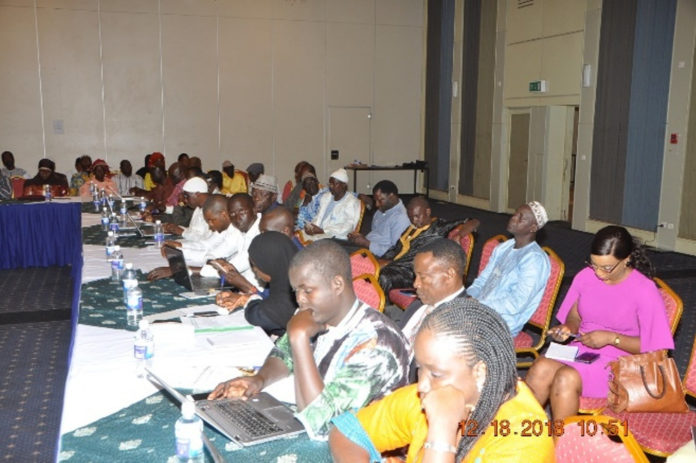Abdoulai G. Dibba
The Government of the Gambia in partnership with the Food and Agriculture Organisation of the United Nations (FAO), on Tuesday December 18th 2018, organized a validation forum on the Agriculture for Economic Growth Baseline Survey Report.
The validation forum which was held at a local hotel in Kololi, aims to present baseline findings, discuss and validate evidences provided by the consultants, and involving relevant state and non-state actors.
Participants are expected to review the evidence gathered on the technical components of the project, provide further information for the consultants and increase the robustness of data available, and elicit additional indicators from the baseline report or stakeholders, to update the project’s logical framework.
In her statement at the validation, Haddy Drammeh Njie deputizing the FAO Country Rep., indicated that to attain the project objectives identified, there is need to agree on the pre-project status of key project components, to facilitate the monitoring of the project and the evaluation of change that is attributable to the project.
She pointed out that the current status of project outcomes and output indicators, were assessed by an independent Consultant Firm, the Institute of Social Research and Development (ISRAD).
“The institute gathered appropriate, quantitative and qualitative data, and provided a descriptive profile of the existing pre-project conditions. This evidence-based information requires common understanding among national stakeholders,” she posited. She said the first draft of the baseline survey report is presented to stakeholders for review and to assess the strength of the evidence gathered.
“We hope the document will be systematically reviewed by stakeholders gathered here, in order to validate it prior to further action by the project team,” she concluded.
“At the start of last year, the EU took the decision to allocate 20.5 Million EURO from the 11th European Development Fund to the Gambia, for a large agriculture and food programme entitled ”Agriculture for Economic Growth and Food Security/Nutrition, to mitigate migration,” stated Darrell Sextone, Programme Manager of EU Delegation to the Gambia, during the validation workshop.
According to him, the 1.2 billion Dalasi programme is self-contained and has three components as
- Component 1: FAO ”Agriculture for Economic growth”,
- Component 2: WFP ”School meals and Disaster Risk Management” and
- Component 3: NGOs ”Support to the 11th EDF agriculture for economic growth and food security/nutrition to mitigate migration programme”.
He told participants that overall the programme aims to create growth and employment opportunities in particular for women and youth, through improved agricultural productivity as well as access to food, whilst at the same time increasing the participation of the most vulnerable smallholders’ in the value chains.
Sextone pointed out that the programme recognises the need for enhanced information system, as well as crises management and prevention to build resilience.
In so doing, he went on to say that the programme is expected to mitigate migration flows to the EU; that the project will be carried out in the North Bank (NBR), Central River (CRR), Lower River (LRR) and Upper River Regions (URR), of the country.
The Deputy Director of the National Disaster Management Agency Serign Modou Joof, representing the Office of the Vice President, indicated that the project is intended to look at three objectives to increase agricultural productivity, diversification and access to food, to strengthen the capacities of farmers and extension workers, and to enhance the quality of selected agricultural crops and livestock services.
According to Joof, the Gambia is considered as one of the least developed and highly vulnerable countries to drought and floods; that about 25% of the population are vulnerable to food insecurity.
He said projects are designed to deliver measurable results, and a good baseline survey must counter the factual, so as to measure and distinguish those results from other variables; that this helps to determine what variables to measure. He urged participants to utilize the research as a means to elaborate a set of hypotheses.
The Deputy Permanent Secretary for Projects and Programmes at the Ministry of Agriculture Omar Jammeh, asserted that as a country, the Gambia has put in place policies and programmes geared towards attaining Food and Nutrition Security.
“These policies and programs are aligned with our National Development Plan (NDP) 2018-2021, with particular emphasis on Modernising our Agriculture and Fisheries for sustainable economic growth, food and nutritional security and poverty reduction,” he stated.
DPS Jammeh informed participants that national policies and programs are aligned with sub-regional, regional and international development frameworks; that foremost among these is the Agriculture and Natural Resources Policy (ANR).
“The ANR is a comprehensive Policy Framework that links Agriculture, Fisheries and the Environment sub-sectors” he concluded.

















